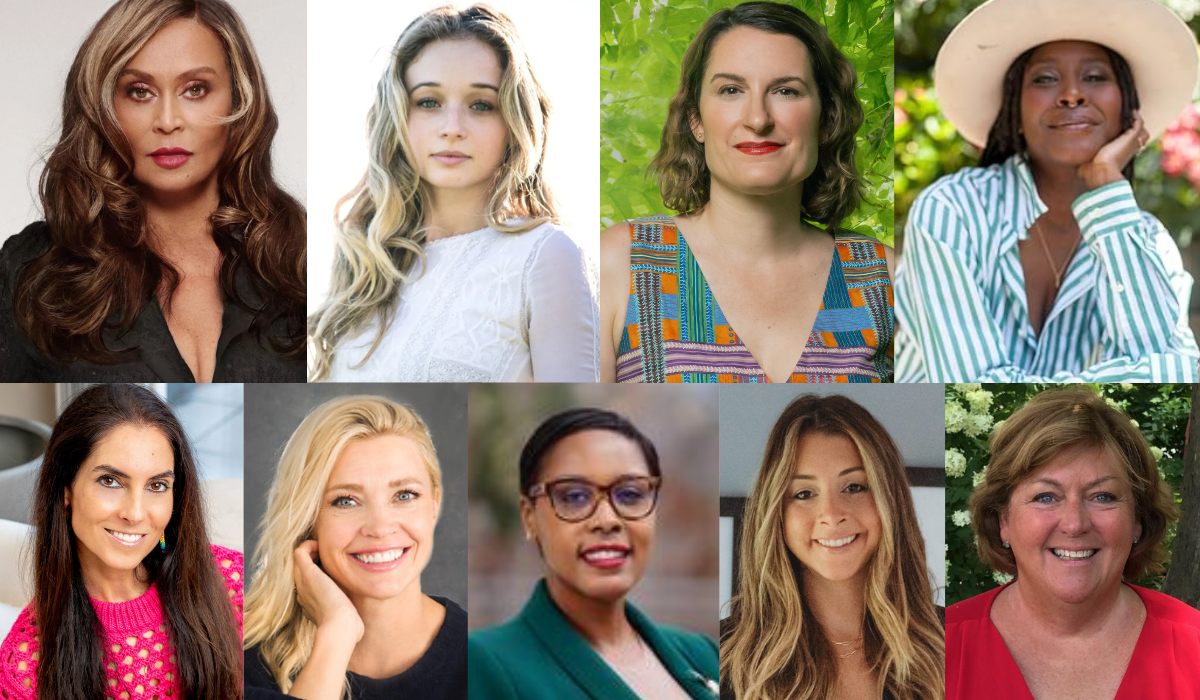The Joys, Challenges, and Realities of Motherhood Today

The holding hands, packed lunches, and goodnight kisses. When we think of mothers, all the light and warmth rise to the top of our minds; understandably, given that mothering is to nurture and love. So it's always a necessary truth to remember the relentless obstacles mothers tackle and the grave realities they face.
Mothering requires intuition, creativity, endless energy, and discernment, which is why this essential role thrives with support. But what does that support look like these days? Or better put, what do modern mothers need from their villages—their families, community, and government?
The Sunday Paper reached out to nine mothers to ask this question. We connected with mothers and grandmothers across backgrounds and fields to garner their takes on how their roles and needs are evolving, and how women truly need support. Their answers are heartfelt and real. And given our nation's lack of a broad care system, they're poignant. "The administration is already rolling back progress in ways that put families—especially those most marginalized—at greater risk," Jamila K. Taylor, president and CEO of the Institute for Women's Policy Research, told us. "Now is the time to expand what works, not dismantle it."
Wherever you do or do not fall on the vast mothering spectrum, we hope these sentiments make you feel seen and valued, which is what you are to us. Because we all need support. We all need each other. And we all need a village.
Happy Mother's Day!
Tina Knowles, fashion designer, art collector, author of Matriarch: A Memoir, and grandmother of six.
“It makes your journey as a mother easier when you have a support system with family or friends. It’s very difficult to raise your kids, be a successful career woman, and balance those two things. It’s even harder if you have to balance your relationship with your partner.
With your village your kids are safe, which allows you the freedom to focus on those other things. Being a good member of your village means always providing a listening ear, shoulder to cry on, advice, and most importantly for them to provide a safe space for your children.”
Brandi Sellerz-Jackson, storyteller, self-care doula, and author of On Thriving: Harnessing Joy Through Life’s Great Labors.
“Mothers, we need space. So much of our lives is spent sharing ourselves, our energy, and our bodies. We nurture and care for those around us. Motherhood is/can be all consuming. And because of this, we need space to be all that we are… beyond the title of “mother”. We are literally everything and then some. We need space to reclaim ourselves in the after, fully…”
Madonna Harrington Meyer, PhD university professor at Syracuse University and author of Grandmothers at Work and the children's book, Grandma’s Joy.
“Grandparenting has become more intensive than it was in the past. Most of the grandmothers I’ve interviewed have said they are doing much more care for their grandchildren than they expected to do, and much more than their parents did for their grandchildren. Many wish they could take their mothering hats off and put their grandmothering hats on. The roles are converging in some families. Grandmothers are providing care before school, after school, weekends, and evenings. They’re helping with homework, preparing and serving meals, and tucking in grandchildren at night. They would like to take their children to the zoo or out for ice cream, but they’re too busy helping with algebra and doctor visits.
Many grandmothers feel very appreciated; their children are quick to acknowledge all that they are doing and thank them. But some feel taken for granted, particularly if gratitude is rare and the expectation to provide even more care is constant. Some screen their calls or continue working long past when they could retire, to be unavailable to provide even more care.
Among the best ways we could help grandmothers is to provide more support to working families. If we assure working parents paid vacation, paid sick days, part-time options, and health insurance, they may be able to rely on grandparents less. Less carework would allow more time for enjoying the grandchildren.”
Jamila K. Taylor, PhD, president and CEO of the Institute for Women’s Policy Research.
“If we’re serious about improving the economic and emotional well-being of mothers and families, we cannot afford to reverse course. The administration is already rolling back progress in ways that put families—especially those most marginalized—at greater risk. Now is the time to expand what works, not dismantle it.
This starts with meaningful investment in care. Programs like Head Start, Early Head Start, and the Child Care Development Fund (CCDF) are critical and must be protected. Congress took a step in the right direction in 2024 with increased funding—$725 million more for CCDF and $275 million for Head Start—but even that little progress is under threat by this administration. Families need more support, not less. The need is urgent.
We also need to treat the childcare workforce with the respect it deserves. That means living wages, access to benefits, and real pathways for career advancement. These workers, mostly women of color, are the backbone of our economy. Policy should protect their right to organize and collectively bargain—basic tools for building power and securing fair workplaces.
We can’t ignore the financial cost mothers shoulder. In 2023, mothers with young children lost an average of $16,500 in annual earnings due to unpaid care work—totaling more than $450 billion in foregone wages. That’s not sustainable.
An overwhelming majority of Americans agree that affordable child care should be a top priority for Congress. It’s time to remove the barriers that keep families from accessing care and fully fund the programs that support them. This is not a luxury—it’s a basic need. Women and families are doing their part. Policymakers need to do theirs. This is what being pro-family really looks like.”
Melissa Kalil, a certified divorce coach and owner of Shrinking Divorce.
“Since its peak in the 1980s, the divorce rate in the U.S. has been on a slow decline and is now hovering around 45 percent. Half of these divorces involve children, the majority of whom live in mother-headed households. Yet after a divorce, men’s household income falls 23 percent while women’s plummets 41 percent, according to the U.S. Government Accountability Office. Considering these statistics, it’s safe to assume that there are hundreds of thousands of divorced mothers out there trying to provide for their children, parent effectively, and heal from one of life’s most stressful transitions.
As if that’s not enough, it’s important to remember that it’s rarely smooth sailing after a woman gets divorced. On the contrary, many of these women struggle as they coparent with someone intent on making their life harder or thwarting their efforts to move on peacefully.
As a divorce coach, I support moms through all stages of the process, and the fear that seems to linger most is always centered around their children’s well-being. Money is a huge concern for obvious reasons, their coparent may be causing endless headaches, a shrinking social circle may leave them feeling lonely and isolated, but it all pales in comparison to the fear and doubt they may feel about raising well-adjusted, happy children in an already chaotic world.
This Mother’s Day, if you really want to put a smile on a divorced mom’s face, tell her what a great parent she is or give her a compliment about her children. For any mom, this sort of recognition is a feather in her cap, but the impact is so much more profound for a single mother. Your kind words may be just the vote of confidence they need to tackle their mental load that day. And if you are a divorced mom, what are you telling yourself about your role as a parent? Being a great mom, starts with believing it.
I tell all divorcing moms that the road of divorce and coparenting is a long one, the sooner you can become your biggest fan, the better you can weather the inevitable potholes along the way. A bonus? Your children will model your self-respect and kindness, a valuable lesson for life to come.”
Erin Erenberg, CEO and Co-Founder of Chamber of Mothers, the largest nonpartisan 501c3 organization advocating for paid leave, affordable childcare, and maternal health.
“What we, as mothers, need most is to know we’re not alone and that our wants and needs matter. We love showing up for our kids, partners, friends, and families. But we also need to know that the dreams we had as girls—the desires carved in our hearts—are still important and attainable.
For many of us, those dreams include leadership, decision-making, and making a meaningful impact in the world. At Chamber of Mothers, these are the deeper reasons we fight for paid leave, affordable child care, and greater investment in maternal health.
Too many mothers are buried under the demands of caregiving, unable to show up fully in society. Our priorities don't seem to be those of the people shaping law and policy. Mothers feel ignored. We’re committed to changing that, so the people who care the most are cared for in return. Just last month, a Chamber of Mothers' mom was the driver behind Arizona’s HB2332 bill on maternal mental health which has already made it to the Arizona Senate.
When we're not carrying the weight of the world, we can come together to change the world.”
Nicole Amoyal Pensak, PhD, clinical psychologist and author of Rattled: How to Calm New Mom Anxiety with the Power of the Postpartum Brain.
“For any mom out there struggling, please know you’re not alone. We’re in a maternal mental health crisis. One in five women will experience a postpartum mood or anxiety disorder. And we’re still relying on a reactive model—waiting until symptoms spiral before we offer support. That’s not care; that’s damage control.
Let’s start a revolution and put the mask on moms first. Let’s build a proactive mental health village around every mother. That means getting moms connected to postpartum-specialized therapists and prescribers before the baby arrives. No more waiting three months for care or scrambling in crisis. A safety net should already be in place.
But addressing the mental health crisis isn’t enough. We’re also wasting an untapped natural resource: the brilliance of moms.
Childbirth rewires the maternal brain. That neuroplasticity, the brain’s capacity to grow and reorganize, boosts caregiving instincts, attunes us to our babies, and fine-tunes survival. It’s as if Marie Kondo showed up, decluttered your brain, and left only what’s essential for caregiving. This process is called matrescence—a developmental stage as significant as adolescence, marked by massive cognitive and emotional transformation.
Moms, all this neural network rewiring doesn’t just benefit babies. The same maternal brain changes that help babies thrive also supercharge moms—requiring a rebrand of the derogatory term “mommy brain.” Our brains become more efficient, resilient, creative, and sharp. These gains are neurologically embedded—and wildly transferable. Leadership. Innovation. Problem solving. The postpartum brain is wired to do it all.
This Mother’s Day, let’s give moms more than flowers. Let’s give them what they actually need: Acknowledgment that matrescence is real. A proactive postpartum care team. And the cultural shift to finally recognize that motherhood fuels brilliance—not burnout.”
Ruthie Ackerman, journalist and author of The Mother Code: My Story of Love, Loss, and the Myths That Shape Us.
What moms really want–and need–from their village right now is for everyone to be calling and emailing their representatives to make sure they support policies such as paid family leave, affordable childcare, flexible work, and maternal mental health and reproductive care. In addition to all of these basic support systems, we’d want our village to recognize that being a mother and a full human isn't an either/or situation. We can be whatever we can dream up AND mothers too without automatically annihilating every other part of ourselves. I'd also love for there to be a 1-800 number I can call when I want to reach my village and ask for things like hot coffee in bed (with refills please!), a massage and a few minutes to read the newspaper in peace. Where is that village?!
Carson Meyer, birth doula, educator, and author of Growing Together: Doula Wisdom & Holistic Practices for Pregnancy, Birth & Early Motherhood.
In my book Growing Together I write about the four pillars of an optimal postpartum period: nourishment from food, rest, support, and touch. In many ways I think these four pillars hold true far beyond the early weeks of motherhood and take on new meanings.
To nourish and be nourished by intentional community.
To rest assured you’re not alone.
To feel the unwavering support of a society that values your role.
To know you’ve touched the heart of another and shaped their life for the better.
Above photo, top row from left: Tina Knowles; Carson Meyer; Ruthie Ackerman; Brandi Sellerz-Jackson. Bottom row from left: Melissa Kalil; Erin Erenberg; Jamila K. Taylor, PhD; Nicole Amoyal Pensak; PhD, Madonna Harrington Meyer, PhD
Please note that we may receive affiliate commissions from the sales of linked products.



